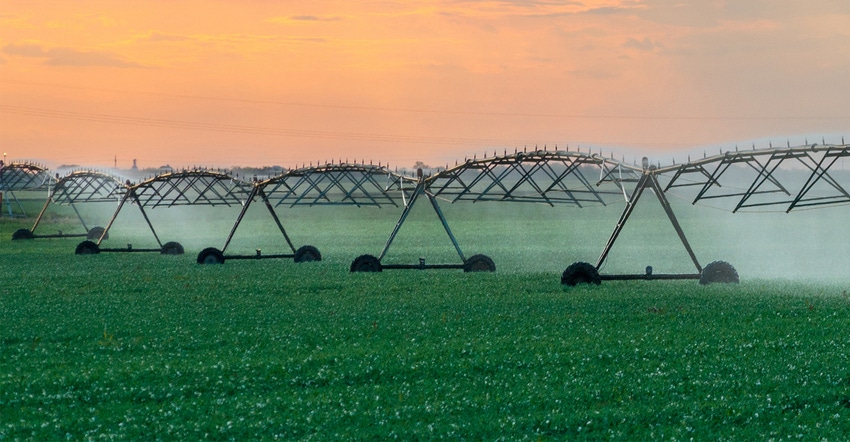
Water has played an especially key role in crop production this year. A cool, wet spring delayed planting — and in many cases prevented planting — at historic levels.
Late-planted crops were slow to develop in some places as cool, cloudy conditions and waterlogged soils limited plant growth and root development. Hot, dry periods typical of midsummer in Michigan arrived in early July, and plants with limited root systems have had difficulty finding water deeper in the soil profile.
Irrigation can address some of these challenges. while crop management can address others. Knowing how to “finish the crop” will be critical in this unusually late and challenging season.
The Michigan Soybean Promotion Committee is sponsoring a Southwest Michigan Crop Production and Irrigation Research Field Day, hosted by Michigan State University Extension, from 8 a.m. to 1 p.m. Aug. 16, north of Sturgis, Mich., on north Centreville Road, a half-mile south of Featherstone Road.
The morning will begin at 8 a.m. with registration and a light breakfast. Presenters include:
Tools for soil moisture monitoring, irrigation scheduling
Lyndon Kelley. The Purdue and MSU Extension irrigation educator will discuss how he uses the soil moisture sensors at the field day site to schedule irrigation.
Steve Miller. The MSU Extension irrigation specialist will discuss traditional and cutting-edge technology for soil moisture monitoring and irrigation scheduling.
Younsuk Dong. A postdoctoral researcher in ag and biosystems engineering at MSU, he will demonstrate the mobile-enabled soil moisture sensor equipment that he is developing, which farmers can use to remotely monitor their fields at a fraction of the cost of other sensors on the market.
Michael Scobie. The irrigation research engineer from the University of Southern Queensland, Australia, has been working on water management for the past 20 years. Most recently, he has been building smart tools to help manage water and energy. Scobie will showcase some mobile phone apps that are being used by farmers in Australia to help them manage their irrigation.
Corn leaf wetness monitoring and tar spot
Bruce MacKellar. The MSU Extension field crop and IPM educator will discuss MSU’s work with tar spot in corn, a disease that has significantly affected fields in at least 27 counties in Michigan in the past two years. He will demonstrate leaf wetness sensor equipment being used in studies this year to determine the effect of timing and duration of corn leaf wetness under irrigation on the potential development of this disease.
Irrigation uniformity check
Lyndon Kelley. He will explain why ensuring irrigation system uniformity is critical and how it is traditionally measured.
Eric Anderson. The MSU Extension field crop educator will show results of a demonstration project using an unmanned aerial vehicle, or drone, to detect differences in sprinkler nozzle output.
Soybean nodulation and crop development research
Manni Singh. The MSU Extension cropping systems agronomist will discuss recent and ongoing research with corn and soybean production. Of interest this year, he will address the question of whether a late-planted crop will be able to make it to maturity this fall and what can be done if things don’t go as planned.
Eric Anderson. He will describe two on-farm research projects being conducted this year, the Michigan Soybean Promotion Committee-funded study with soybean inoculation pre- and postplant and the effect on nodulation and yield, and a statewide project funded by the Michigan Department of Agriculture and Rural Development’s Fertilizer Grant gathering corn stalk nitrate and soil health data in commercial corn to further our understanding of effects of various production practices.
Soybean production in a late-planted season
Mike Staton The MSU Extension soybean educator will discuss several delayed planting resources produced or updated by MSU this year. He will specifically address late-season soybean development and what can be done in the event of an early frost.
The meeting will conclude by 1 p.m. with a free lunch and a talk by local Department of Natural Resources wildlife biologist Ken Kesson about deer management in crops.
Several presenters will be available following the meeting for one-on-one consultation. Two MDARD pesticide recertification (RUP) credits and 3.5 Certified Crop Advisor CEU’s will be available.
The cost is free, but registration is required for space and meal planning. Register online by Aug. 14. Download the program flyer for more information.
Contact Eric Anderson at [email protected] or 269-467-5511 for information, or for requests for accessibility accommodations.
Anderson is an MSU Extension field crop educator.
About the Author(s)
You May Also Like






